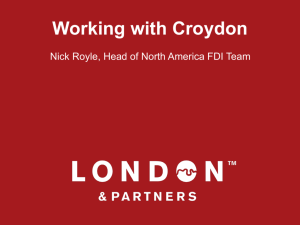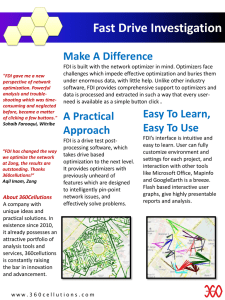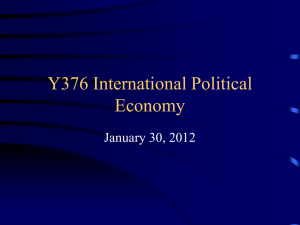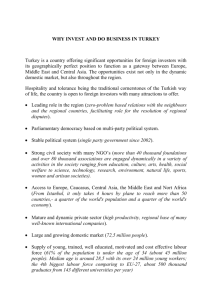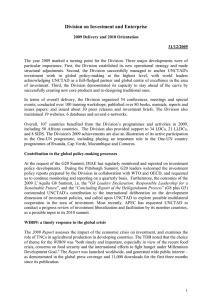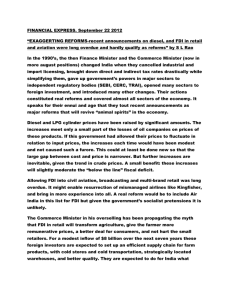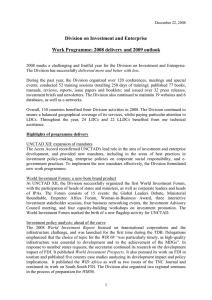UNCTAD - WAIPA Investment Conference Palais des Nations Geneva, Switzerland
advertisement
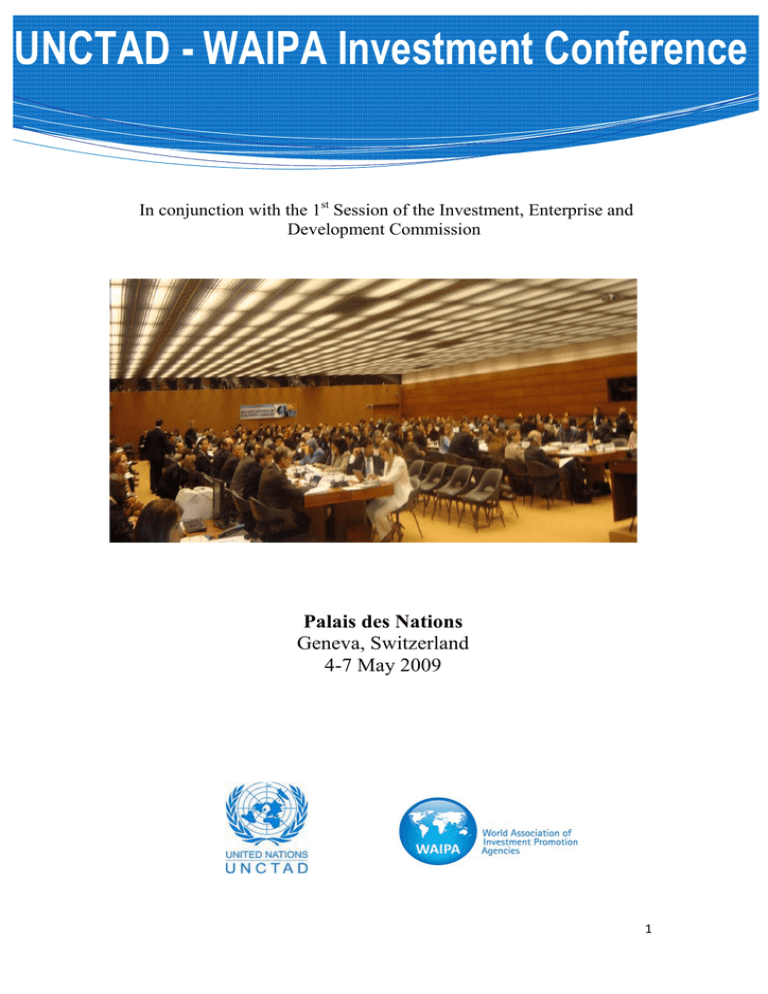
UNCTAD - WAIPA Investment Conference In conjunction with the 1st Session of the Investment, Enterprise and Development Commission Palais des Nations Geneva, Switzerland 4-7 May 2009 1 The programme 2 Overview The UNCTAD/WAIPA Investment Conference 2009 was held on the occasion of UNCTAD's 1st Session of the Investment, Enterprise and Development Commission (4-8 May 2009). It brought together 150 participants from 20 ministries, 30 investment promotion agencies (IPAs), 30 national and international organizations, as well as various private sector companies and think tanks. The Conference focussed on issues that are pertinent to IPAs in light of the global economic crisis. It featured a High-level Session on Best Practices in Investment Policies, workshops and seminars. Officials and delegates also participated in discussions on the recently conducted UNCTAD investment policy reviews of the Dominican Republic and Nigeria. In his opening address, Dr. Supachai Panitchpakdi, Secretary-General of UNCTAD, noted that, so far, very little had been said on the impact of the crisis on foreign direct investment (FDI) and that the first session of the Commission was timely. The economic environment, despite the first signs of recovery, was still highly uncertain. "We need to highlight to the global community Opening address by the implications for investment Dr. Supachai Panitchpakdi, Secretary-General of UNCTAD and enterprise development. You cannot have recovery without going into new investment, new employment. The financial sector must be cleaned up and be able to support new rounds of investment" according to the Secretary-General. With regard to FDI flows, all indicators – including the sharp fall of profits of enterprises, the limitation of resources and the reduced propensity to invest overseas – pointed to a far deeper decline in FDI in 2009 as well as a negative impact on the operations of transnational corporations (TNCs) in developing countries. Despite such predictions, there were nevertheless some positive forces favourably affecting FDI, such as the decline of asset prices creating new investment opportunities, the possibility of larger South–South FDI flows, the opportunities offered by environment related industries or energy, and increasing demand in some emerging economies. Overall, the most probable scenario for the future trends of FDI flows was a U-shaped recovery, with a real positive impact on investment and employment by 2011. Thus, the right policies would be key. 3 High level session on Best Practices in Investment Policies Experts and delegates reaffirmed the positive contribution that FDI had made and could make in economic and social growth, including through its positive employment and balance-of-payments effects, transfer of skills and technology, competition effects, and productive capacity-building, particularly for emerging economies. While such positive effects were particularly needed in the current environment, given the global financial and economic crisis, many expressed concern and uncertainty regarding the types of policies that would be most conducive to generating FDI inflows and subsequent development. In light of the economic crisis and governments’ fiscal stimulus packages, participants discussed the role of FDI in financing infrastructure projects, specifically those of roads and electricity. Although there was general agreement on the advantages of using FDI for this purpose (given shortfalls in domestic credit availability), some stressed the need to implement policy frameworks for maximizing the development effects of FDI. Identifying best-fit policies and the proper pacing and sequencing were considered crucial in this context – an issue raised, amongst others, by LDCs. Preparing the private sector for long-term public–private partnerships in infrastructure was also considered important. A second issue linked to the current crisis related to the recent G-20 commitments to refrain from raising barriers to international trade and investment. Participants praised those commitments, along with the monitoring of those commitments by relevant international organizations, including UNCTAD. In terms of attracting FDI, participants highlighted the need for effective IPAs, amongst others, to provide foreign investors with a one-stop shop. Well-executed investment promotion marketing was seen as a valuable tool with which to improve perceptions held by foreign investors, or to raise the profile of small developing economies. Participants stressed the benefits of adhering to simple and transparent investment rules for attracting FDI, and shared examples of countries that had shown significant progress in those areas. For example, some countries reported reducing the time necessary for certain procedures and improving their score in the World Bank’s “Doing Business” report. Administrative capacity and efficiency are crucial for creating an environment that attracts foreign investment, and many delegates highlighted their countries’ experiences, including in the context of training public officials. Overall, it was considered important to ensure that efforts to attract FDI would not result in a competitive “race to the bottom”. 4 The participants appreciated UNCTAD’s efforts to help countries improve their institutional environment to attract FDI and make it work better for development. The organization's role in helping devise policies to cope with the current situation was seen as highly critical, and collaboration between UNCTAD and the World Association of Investment Promotion Agencies (WAIPA) in organizing the session was cited as a good initiative. High Level Session Panel Highlighted by speakers FDI to finance infrastructure projects demands implementing policy frameworks to maximize its development effects. G-20 commitments to refrain from raising barriers to international trade and investment were praised along with the monitoring of those commitments by relevant international organizations Effective one-stop shop services are a must for foreign investment Well-executed investment promotion marketing is a valuable tool to improve and raise country profiles, in particular of small developing economies. Simple and transparent investment rules for attracting FDI are beneficial. Efforts to attract FDI should not result in a competitive “race to the bottom”. 5 Investment Policy Reviews 5 May 2009, 10h00-18h00 The Conference included meetings on the Investment Policy Reviews (IPR) of Nigeria and the Dominican Republic. IPRs provide an objective evaluation of the policy, regulatory and institutional frameworks for FDI in beneficiary countries, with the objective of attracting increased FDI and maximizing the benefits from it. Dominican Republic Since 2004, FDI inflows to the Dominican Republic have been consistently increasing. With this in mind, the IPR encouraged the Dominican Republic to adopt a new investment law to reflect the good treatment of foreign investors in practice. It also suggested that the government strengthen their investment promotion efforts. The establishment of a "national system of investment promotion" whereby a strengthened national IPA and all other agencies involved in promoting investment could coordinate their activities through a network of servicelevel agreements and report to a Minister of Investment. In his intervention, H.E. Mr. Eddy Martinez Manzueta, Minister and Executive Director of the Centre for the Promotion of Exports and Investment (CEI-RD), pointed out that several recommendations in the report have already been implemented with the assistance of UNCTAD. These include revision of key investment legislation and agreements; modernization and rationalization of the institutional framework for FDI promotion; improvements in FDI-related data collection; and the introduction of a competition law and competition agency. He also called on the donor community to assist the country in implementing further technical assistance in such areas as dispute prevention policies, reform of the fiscal regime, and the launching of linkages to better integrate foreign investors and local small and medium-sized enterprises. There was general understanding that the Dominican Republic is a Panel of the Dominican Republic Investment Policy Review case where significant progress has been made to improve the conditions for FDI attraction and that this has 6 resulted in important economic changes. However, the country needs to strengthen the implementation and enforcement of new legal and economic reforms. UNCTAD reaffirmed its commitment to assist the Dominican Republic with follow-up support actions on those recommendations accepted by the Government. Nigeria The meeting highlighted reforms the Nigerian government had made towards their investment framework, but urged the government to adopt policies that can induce and support foreign affiliates to make efforts to increase highvalue-added manufacturing. It also emphasized the need for the country to improve the overall environment for doing business, and recommended that Nigeria adopt an effective investment promotion approach. The IPR urged the government to design and implement a strategy to attract non-oil FDI, focused around key measures to improve the regulatory framework; invest in physical and human capital; take advantage of regional integration; review external tariffs; foster linkages and local industrial capacity; and strengthen institutions dealing with investment and related issues. It also indicated that the Government had an important role to play in image-building, in promoting public-private sector dialogue, in ensuring the passage of more investor-friendly legislation through the National Assembly, in using oil revenues for local supplier development and poverty reduction, and in developing strategies for specific sectors. The Government and the private sector could partner to address the shortage of electricity and the development of human capital. H.E. Mr. Humphrey Enemakwu Abah, the Minister of State for Commerce and Industry, reported progress on a number of the report´s recommendations, including the setting up of a "one-stop shop" for investment facilitation, and a review of all fiscal and financial incentives to investors in different economic sectors. UNCTAD also reaffirmed its commitment to assist with follow-up support actions on those recommendations accepted by the Nigerian Government. Members of the Panel at the Nigerian Investment Policy Review 7 Workshops and Seminars Administrative Efficiency for Boosting Productive Capacity in Times of Crisis-Creating an environment conducive to productive capacity-building Wednesday, 6 May 2009, 10h00-13h00 Administrative efficiency covers three major topics: transparency, simplification and automation of business-related administrative procedures (automation is often referred to as "e-government"). In the training session, developing and developed countries were asked to deliver comments addressing different aspects of the issue of administrative efficiency. Most of the comments highlighted the practical experience of several Member states in developing a “one-stop shop” within their countries for streamlining applications for the formation of enterprises and their operations. Most speakers underlined the importance of administrative efficiency to alleviate the administrative cost weighing on enterprises, boost productive capacities and bring entrepreneurs to the formal sector. Enhancing administrative efficiency was also seen as a way to diminish administrative misconduct and a useful approach against corruption. Key points emanating from the discussions include: Countries should create “one-stop shops” for enterprise creation and investment licensing, and make maximum use of internet technology in this process. Governments should embed the development of “one-stop shops” within a broader reform process. Governments should consider including members of the private sector in the design (and possibly, implementation) of the resulting “one-stop shops” to ensure the process is responsive to users needs. Countries should exchange experiences with each other as part of a continuing improvement process of identifying new tools (especially software tools) and new ways to streamline administrative procedures without sacrificing the quality of regulations. In particular, South-South cooperation should be encouraged. - 8 Promoting Foreign Investment in Tourism Wednesday, 6 May 2009, 10:00-18:00 With close to 40 participants including ministers, ambassadors, directors and officials from IPAs, academics and international experts, this one-day workshop focused on three major topics – Investment Trends in light of the current economic crisis, strategies for the promotion of FDI in the tourism sector and; investor targeting and development. The workshop discussed the need for linking investment in tourism with development as well as the role of public-private partnerships (PPPs) for the development of infrastructure. Case studies highlighting the Indian, Jamaican and Tanzanian experience with regards to promoting investment into the sector were also presented, enriching the discussions. Key points emanating from the discussions include: FDI in tourism is mainly associated with contract management, licensing and franchising. Although more and more TNCs are investing directly in hotels and other tourist assets in developing countries, the role of local private and public sector continues to be determinant. PPPs in infrastructure development have proven successful in various developing countries. An integrated, coherent approach and policy framework is essential to ensure greater benefits from TNC participation in the tourism industry and to minimize potential negative impact. It is not so much about promoting a different kind of tourism, but rather about promoting tourism differently, in ways that create more and better linkages throughout the value chain. To stimulate investment in tourism, it is necessary to have a well-defined sector strategy with a master plan and realistic timetable. The master plan should address all strategic issues: infrastructure, institutions, accommodation, tourism facilities and services, means of access and transportation, attractions, tourism markets, etc. Investor targeting is a screening process which involves identification of specific investment projects, careful planning and management of investor search programmes, a study of target company priorities, and confidential contacts with corporate executives. On the other hand, chances of success will be increased by choosing projects that best fit to the country's capacity and the expectations of potential investors. 9 Investment Policy Reviews - Best Practices and Lessons Learnt Wednesday, 6 May 2009, 15:00-18:00 The aim of the seminar was to draw lessons from UNCTAD’s advisory work on investment policy, particularly through its Investment Policy Review programme. The seminar focused on three major topics that developing countries are usually confronted with when designing policies to attract FDI: Tax policy Attraction and development of human capital, and Infrastructure development. About 20 participants attended the seminar, including directors and officials from IPAs, academics and international experts on FDI. Investment Promotion Provisions in International Investment Agreements Thursday 7 May 2009, 10:00-13:00 The objective of the workshop was to introduce recent trends and developments in international investment rulemaking, as well as provide the international legal framework for investment. The first part of the workshop focused on international investment agreements (IIAs) and the challenges posed by the contemporary international universe of IIAs, including the problem of policy coherence and overlapping commitments. The second part was dedicated to the role of the Multilateral Investment Guarantee Agency (MIGA) of the World Bank in insuring foreign investors against political risk. The third part of the workshop covered investment promotion provisions in IIAs - it emphasized the purpose of IIAs as a means of attracting foreign investment. About 30 participants attended the workshop, including IPA officials, international experts and delegates from various permanent missions to the United Nations in Geneva. For more information on UNCTAD's Investment and Enterprise programme visit: www.unctad.org/diae 10

